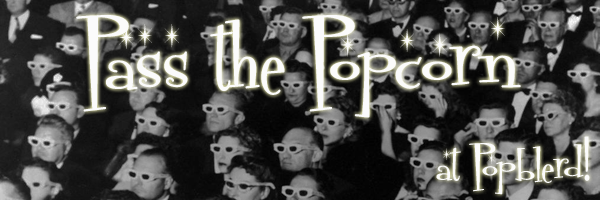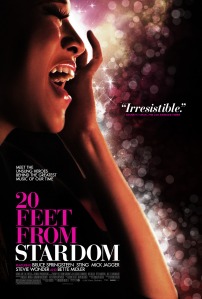 When was the last time a movie made you want to stand up and cheer?
When was the last time a movie made you want to stand up and cheer?
Like, legitimately want to stand up and cheer.
 If you’re anything like me, you’ll have to reset your clock after seeing 20 Feet from Stardom, an excellent new documentary about folks you’ve definitely heard, but likely have never heard of: backup singers like Merry Clayton, Lisa Fischer, Táta Vega, Darlene Love, and Claudia Lennear.
If you’re anything like me, you’ll have to reset your clock after seeing 20 Feet from Stardom, an excellent new documentary about folks you’ve definitely heard, but likely have never heard of: backup singers like Merry Clayton, Lisa Fischer, Táta Vega, Darlene Love, and Claudia Lennear.
These are people who’ve worked with the greatest legends in music — Bruce Springsteen, Stevie Wonder, David Bowie, Bette Midler, Michael Jackson, Elvis Presley, the Rolling Stones, Sting, Joe Cocker, Ray Charles, and so on — and yet never gained similar name recognition, even though the songs they’re featured on wouldn’t be half as good or half as memorable without their vocals.
The film is essentially a tour through the history of rock & roll over the last 50 or so years, told through the eyes, ears, and voices of those who were, as the title indicates, so close to the spotlight they could taste it.
Director Morgan Neville shows how a kind of institutional racism and sexism worked both for and against these singers. These were largely African-American female singers who were brought in to add some soul to the music of men. They know, from years singing in church choirs, how to be true team players, building up the singers in front of them, and making them sound better, without stealing the spotlight.
But it wasn’t just racism or sexism that worked against these backup singers. Sometimes it was not enough ego or drive, or just sheer bad luck, that prevented them from ever reaching the big time. And yet, those they’ve worked with — many of whom are interviewed here — are forever in debt for the contributions they made.
 We are too, without even realizing it. In these days of Auto-Tune, when many singers often provide their own background vocals, there’s not as much need for additional singers on a track. But on so many classic songs, it’s the backup singers who provided the hooks we remember and sing along with.
We are too, without even realizing it. In these days of Auto-Tune, when many singers often provide their own background vocals, there’s not as much need for additional singers on a track. But on so many classic songs, it’s the backup singers who provided the hooks we remember and sing along with.
Take, for example, the Lou Reed song “Walk on the Wild Side,” which, of course, includes the line “and the colored girls sing doo-doo-doo-doo-doo-doo-doo-doo …” That song opens the movie, and appropriately so. The film also includes David Bowie’s “Young Americans,” which featured a young Luther Vandross on backup vocal. Hearing these songs (and others) in this context makes you appreciate them anew, and approach them with a new ear.
An archival clip of Vandross singing backup is one of the film’s many highlights. Another is Clayton telling the story of how she was called in the middle of the night to perform on the Rolling Stones’ “Gimme Shelter.”
Arriving at the studio pregnant and with rollers in her hair, she knocked out her part — “Rape! Murder! It’s just a shot away!” — in just two takes. In the film, Neville isolates her vocal track, and we sit there in awe, watching Clayton in that same studio, listening to her incredible performance. She just soaks it in, still proud of her work all these years later, and we get chills as if listening to the song for the first time.
Powerful stuff, those pipes of hers.
 It’s no wonder singers like Clayton have the confidence they do: They’re awesome. Which makes it doubly frustrating and heartbreaking to hear the stories of them being taken advantage of and not succeeding.
It’s no wonder singers like Clayton have the confidence they do: They’re awesome. Which makes it doubly frustrating and heartbreaking to hear the stories of them being taken advantage of and not succeeding.
Take Love, whose story serves as the emotional centerpiece of the film. The first great backup singer, Love was the template and role model for so many entering the business in the 1950s and ’60s. (In the movie, she’s referred to as “the cause of all this.”) The film details how über-producer Phil Spector used Love’s voice on so many of his songs, in both backup and lead roles, often with someone else’s name attached instead of hers, and how he made promises to Love that he never kept. Eventually, after years of Spector screwing her out of profits, Love ended up flat broke and was cleaning houses to make ends meet.
It was while cleaning a house in Los Angeles, Love explains, that she heard her holiday song “Christmas (Baby, Please Come Home)” playing on the radio and realized her destiny was to be singing. So she got her life back together, moved to New York, began acting (in films like the Lethal Weapon series and the Broadway musicals Leader of the Pack and Hairspray), eventually sued Spector for back profits and won, and restarted her music career.
Now, she’s a member of the Rock & Roll Hall of Fame, and her annual appearance on Late Show with David Letterman to sing that same Christmas song is a beloved holiday tradition. Like the story of Rodriguez in last year’s Searching for Sugar Man also showed, delayed recognition can be really sweet.
Love’s story may have a happy ending, but in 20 Feet from Stardom it’s the exception to the rule. As the film makes clear, for every breakthrough like her’s or Vandross’, there’s a Clayton who just couldn’t make that leap, or a Lisa Fischer who is content not to.
 For a more recent example, there’s Judith Hill, who is also featured in the film. As you may know, Hill was a contestant on The Voice this season (it was her ouster that lead Adam Levine to utter the words, “I hate this country”). Despite being featured on a national TV show, and singing with Michael Jackson in the movie This Is It, it looks like Hill still has a long way to go before she’s a star.
For a more recent example, there’s Judith Hill, who is also featured in the film. As you may know, Hill was a contestant on The Voice this season (it was her ouster that lead Adam Levine to utter the words, “I hate this country”). Despite being featured on a national TV show, and singing with Michael Jackson in the movie This Is It, it looks like Hill still has a long way to go before she’s a star.
And yet, 20 Feet From Stardom makes a strong, rousing case that Hill and these other singers are already stars, and are more than worthy of our praise and attention.
That’s why, even though it’s filled with stories of disappointment and frustration, 20 Feet From Stardom is the kind of film that can’t help but bring a giant smile to your face.
When it ends, and we see Love performing “He’s a Fine, Fine Boy” backed by Springsteen and the E Street Band at the Rock & Roll Hall of Fame 25th Anniversary concert, it’s a nice symbolic turnabout. You’ll be tempted to jump to your feet and give her, and all the other talented vocalists in the movie, a long delayed but well earned round of applause.
And then you’ll want to watch the movie again. And again. And again.
This review originally appeared on Martin’s Musings.
